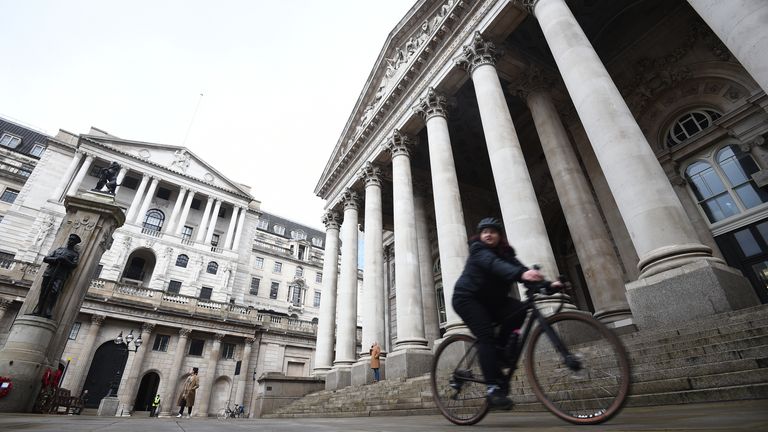The Bank of England has warned inflation will increase further this year to double the target rate, but insisted rising prices will only be temporary as it kept interest rates on hold.
The monetary policy committee (MPC) also kept in place measures to bolster the economy, despite some calls for them to be cut to cool cost pressures.
Latest economic forecasts from the Bank show it expects inflation to peak at 4% in 2021, against a previous prediction of 2.5%.
Inflation is above our 2% target. We expect it to rise further before falling back to our target. https://t.co/gZfLBg8Gqh #MonetaryPolicyReport pic.twitter.com/eLb8188CzH
— Bank of England (@bankofengland) August 5, 2021Although twice the government-set target, the Bank said it would be “transitory” and inflation will return to 2% in the medium term.
Although the MPC voted unanimously to hold rates at 0.1%, one member Michael Saunders voted to cut its £895bn bond-buying quantitative easing (QE) programme by £45bn in the face of concerns about hikes in inflation, but was outvoted by seven to one.
AdvertisementHowever, the committee said some “modest tightening” of monetary policy is likely to be needed in due course to cool inflation, indicating action may be on the way.
The Bank said: “The committee’s central expectation is that current elevated global and domestic cost pressures will prove transitory.
More on Bank Of England Warning issued over financial sector’s reliance on cloud computing Alan Turing £50 banknote enters circulation – as LGBT-inspired artwork unveiled at GCHQ to honour wartime hero ‘Britcoin’: Bank of England seeks views on economic impact Bank of England forecasts strong COVID recovery with biggest economic bounce-back since WWII Bank of England targeted by Extinction Rebellion in ‘fake oil’ spray protest COVID-19: Bank of England sees slightly stronger spring spending bounce-back“Nonetheless, the economy is projected to experience a more pronounced period of above-target inflation in the near term than expected in the May report.”
The Bank kept its growth forecast at 7.25% for 2021, as it said gross domestic product (GDP) was set to have risen by a better-than-expected 5% in the second quarter, but will slow to around 3% – weaker than first forecast – in the third quarter.
However, the 2021 prediction would still mark the fastest growth since the Second World War.
Its latest set of quarterly forecasts shows it expects the economy to then grow by 6% in 2022 and by 1.5% in 2023, compared to previous forecasts of 5.75% and 1.25% respectively.
The Bank said: “UK GDP (gross domestic product) is projected to recover further over the remainder of the year, reaching its pre-pandemic level in (the fourth quarter of) 2021, with demand growth boosted by a waning impact from COVID.
“Further out, the pace of GDP growth is expected to slow towards more normal rates, partly reflecting the gradual tightening in the stance of announced fiscal policy.”
It added: “Frictions in the labour market are judged likely to dissipate over the forecast period, boosting growth in effective supply capacity.
“There is uncertainty around these judgements, including how the economy will adjust to the end of the furlough scheme.”
Image: The Bank’s former chief economist Andy Haldane had called for a cut to QEThe Bank’s downgrade to third-quarter growth forecasts comes as the Delta COVID-19 variant impacted spending following a surge in pent-up demand as lockdown restrictions eased.
It said the new coronavirus strain and voluntary social distancing could pose a risk to the growth outlook, although it added if recent improvements in new cases continues this might boost GDP prospects.
There had been speculation the Bank could halt QE as the UK’s economic recovery spurs on sharp rises in the cost of living.
The Bank’s former chief economist Andy Haldane had repeatedly called for a £50bn cut before he left the committee last month.
While a majority voted to leave the economy-boosting measure unchanged, the Bank did outline its approach to removing it when necessary.
It said it would start to unwind QE when the interest rate reaches 0.5%, which is lower than the previous threshold.
